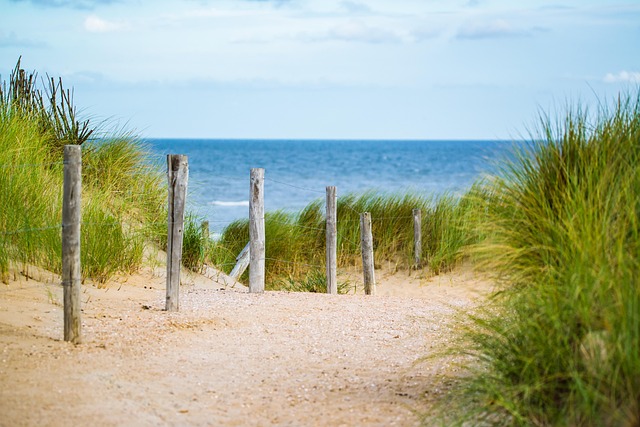Coastal areas present unique challenges when it comes to fencing, with harsh weather conditions and saltwater exposure demanding durable solutions. This article explores the benefits of using sturdy wooden fencing for coastal properties, highlighting its resilience and aesthetic appeal. We’ll guide you through choosing the right wood species, installation techniques tailored to coastal environments, and maintenance tips to ensure longevity in challenging conditions. Additionally, we’ll discuss how this type of fencing can enhance property value.
- Understanding Coastal Area Challenges for Fencing
- Benefits of Durable Wooden Fencing Materials
- Choosing the Right Wood Species for Coastlines
- Installation Considerations for Coastal Environments
- Maintenance Tips for Longevity in Saltwater Exposure
- Esthetic Appeal and Property Value Enhancement
Understanding Coastal Area Challenges for Fencing
Coastal areas present unique challenges when it comes to installing fencing due to their harsh environments. Saltwater, strong winds, and fluctuating temperatures can significantly impact materials over time. Traditional fences often struggle to withstand these conditions, leading to regular maintenance or premature replacement. The coastal landscape also demands fencing solutions that blend aesthetically with the surrounding natural beauty.
Durable wooden fencing for these areas needs to be robust enough to resist corrosion from saltwater and maintain its structural integrity against constant exposure to wind and varying climates. Choosing the right type of wood and properly treating it is essential. Additionally, innovative designs and finishes can enhance the fence’s longevity while ensuring it complements the coastal setting, creating a harmonious outdoor space.
Benefits of Durable Wooden Fencing Materials
Durable wooden fencing materials offer numerous advantages for coastal areas. Firstly, wood is a renewable resource, making it an eco-friendly choice that contributes to sustainability. Unlike synthetic alternatives, natural wood can biodegrade, reducing environmental impact over time. Moreover, specific types of treated wood, such as cedar or pressure-treated pine, possess exceptional resistance to rot, mold, and pests commonly found in coastal regions. This longevity ensures the fence remains structurally sound for years, minimizing maintenance needs and costs.
Additionally, wooden fences provide excellent aesthetic appeal with their natural beauty and diverse styling options. They can complement various architectural styles, enhancing the curb appeal of any property. The warm tones and textures of wood create a welcoming atmosphere, making them popular choices for residential and commercial settings along coastlines.
Choosing the Right Wood Species for Coastlines
When selecting wood for coastal fencing, understanding the environment is key. Salty air, frequent moisture, and potential exposure to elements like sun and wind can significantly affect a wood’s durability. Opting for rot-resistant species like cedar or redwood is an excellent start. These woods have natural oils that repel water and inhibit mold growth, making them ideal for coastal locations.
Furthermore, looking for wood with a high Janka hardness rating—a measure of its resistance to denting and cracking—is advisable. Species such as teak or Australian cypress offer exceptional hardness, ensuring your fence can withstand the rigors of coastal life without succumbing to pressure from strong winds or salt corrosion.
Installation Considerations for Coastal Environments
When installing durable wooden fencing in coastal areas, several unique considerations come into play. The harsh marine environment poses challenges that differ from those found inland. First, it’s crucial to choose fence materials resistant to salt spray and moisture, which can accelerate wood decay. Treated, weather-resistant woods like cedar or pressure-treated pine are good options. Additionally, ensuring proper drainage is essential; install fences slightly elevated and incorporate gaps to prevent water accumulation around the base.
Another important aspect is maintenance planning. Coastal areas often experience high winds and extreme weather events, so robust installation techniques are vital. Use reinforced posts set deep into the ground for added stability. Regular cleaning and re-treatment with preservatives can significantly extend the life of the fence. Consider additional protective measures like applying a clear coat or sealer to further shield the wood from the elements.
Maintenance Tips for Longevity in Saltwater Exposure
To ensure your wooden fence lasts through coastal conditions, proper maintenance is key. The saltwater environment can be particularly harsh, so regular cleaning and treatment are essential. Start by pressure washing the fence annually to remove any built-up salt or debris. This deep clean helps prevent rot and keeps the wood looking fresh. After washing, apply a high-quality water-repellent sealer designed for exterior use. Reapplying this coating every 2-3 years will create a protective barrier against moisture and salt, prolonging the fence’s life significantly.
Additionally, check the fence for any signs of damage or decay regularly. Quick action on issues like split boards or loose posts can prevent major problems down the line. Consider using stainless steel hardware to avoid corrosion in saltwater. Lastly, make sure the fence is properly braced and anchored to withstand coastal winds and waves, ensuring it remains sturdy and durable over time.
Esthetic Appeal and Property Value Enhancement
Durable wooden fencing offers more than just functional benefits for coastal properties; it significantly enhances aesthetic appeal and property value. The natural beauty of wood, when treated properly for salt resistance, can complement and elevate the overall look of a home or business. From classic, traditional styles to modern, sleek designs, custom wooden fences allow homeowners to express their personal taste while seamlessly integrating with coastal environments.
Moreover, investments in durable wooden fencing can significantly boost property values. Real estate experts attest that well-maintained outdoor spaces, especially those featuring appealing fencing, are highly desirable to potential buyers. The added curb appeal and sense of privacy or security that a quality wooden fence provides can make a property stand out in the market, potentially leading to faster sales and higher selling prices.
